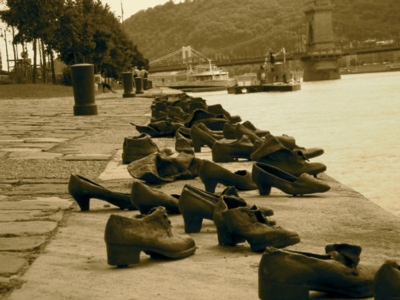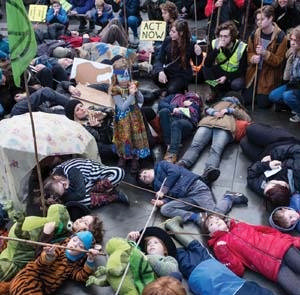
It’s dominant theme is Hungary’s role in the organised murder of some 600,000 of its citizens, many in Auschwitz, during 1944-45, the final year of the Second World War. The victims were mostly Jews but also included gypsies, homosexuals and political dissidents. The building includes a renovated former synagogue, now forming part of a permanent exhibition called “From Human Rights Abuse to Genocide”, a harrowing multi-media exploration of just who did what to whom, and why. The centre has acquired an international reputation for independent scholarship and remains at the heart of the difficult but necessary process of the country coming to terms with its culpability in the Holocaust.
But the Centre has recently come under attack from Hungary’s populist, ultra-conservative government, motivated, it seems, by a desire on the part of the state to shirk responsibility for the events the Centre so powerfully memorialises. This has a pragmatic economic motive, but can also be seen as part of a wider strategy on the European political right to trivialise the Holocaust.
It started when András Levente Gál, Under-Secretary of State at the Ministry of the Economy and Justice, made a much-publicised visit to the museum. Gál is a lawyer with experience gained on the controlling boards of various mass communication media. He is a civil servant answerable to a cabinet minister, but in Hungary such appointments are political and carry great power.
Gál expressed displeasure at the museum’s interpretation of the role of the Hungarian state in the Holocaust because, he said, it “distorted” (his preferred view of) history and might generate “unnecessary tensions”. He declined to accept the responsibility of the state for a wide range of wartime atrocities culminating in the transport of the country’s provincial Jewry to the gas chambers, and sought instead to shift the blame on to the token German force stationed in Hungary at that time and on to certain unnamed “wicked and greedy” individuals. Following this visit he called for substantial changes in the permanent exhibition.
László Harsányi, the managing director of the museum, responded robustly, saying he would not refashion historical exhibitions according to current government policy. He was summarily fired from his job by a new board of controllers, appointed by Gál.
The ensuing controversy coincides with the passage by the National Assembly of a new constitution that also plays down Hungary’s responsibility for the Holocaust. The legislation has been muscled through by the two-thirds parliamentary majority enjoyed by Prime Minister Viktor Orbán’s conservative Fidesz party, elected in 2010. Two of Hungary’s three opposition parties boycotted the vote in disgust and the third voted against the measure, but to no avail: the constitution will come into effect on 1 January.
The motives behind the new constitution are clearly ideological, but there is a sinister financial incentive too, at least judging by a document published by Gál on an official website. In this the trained lawyer details several substantial restitution disputes arising from the Holocaust which are currently making their way through the American courts. These include the infamous Gold Train, which carried $4-billion-worth of mostly Jewish treasure stolen by the Hungarian state, damages claimed from the Hungarian State Railways by the survivors and descendants of Jews transported to the death camps, and the ownership of the legendary Herzog collection of some 40 Old Masters worth an estimated $100m, including several coveted paintings by El Greco, looted during the war and still on display in state-controlled Hungarian galleries.
Gál argues that the administration intends to pursue its interests in the courts by “setting a new framework for the discussions”. That framework, which denies the culpability of the state for its wartime record, is now enshrined by the Hungarian constitution.
These disputes could land up before the European Court of Human Rights (of the Council of Europe) or the European Court of Justice (of the European Union), both of which exercise jurisdiction in Hungary.The international courts are unlikely to be swayed by the cynical new Hungarian constitution. Nevertheless, it will strengthen the administration’s defensive strategy.
This constitution ushers in a new official line on Hungarian history, summarised in the preamble: “Our country lost its national self-determination on 19 March 1944, and it was restored only with the advent of the first democratic elections that took place on 2 May 1990. That is the day we accept as the beginning of the country’s new democratic constitutional (legal) order.” In a rhetorical sleight of hand, it recasts Hungary from perpetrator to victim: “We do not accept that the heinous crimes committed against the Hungarian nation and its citizens during the Nazi and the Communist dictatorships can be subject to any statute of limitations.”
This is reminiscent of the stance only recently abandoned by neighbouring Austria, which had managed for many years to shrug off Jewish restitution claims arising from Holocaust atrocities by masquerading as a wartime victim of Nazism rather than its willing supporter. In 2000, under the weight of huge international pressure, Austria belatedly established a “Reconciliation Fund” to make “voluntary” restitution payments to slave labourers abused by the Nazis.
The Hungarian constitution also falls in line with an insidious trend sweeping post-Soviet Eastern Europe to trivialise the Holocaust by characterising both the Nazi and Soviet eras as one long period of foreign occupation. By glossing over the differences in the nature and magnitude of the Nazi and the Communist crimes, this view obfuscates the culpability of these countries for the Holocaust, which had arguably already begun in this region long before the territorial expansion of Nazi Germany that eventually led to Soviet control.
These and other aspects of the constitution that undermine human rights and the checks and balances of the democratic process have provoked mass protests in Hungary. They have also attracted severe criticism from the European Parliament, the Council of Europe and Amnesty International. But even Hungary’s legal obligations entailed in its nascent EU membership cannot prevent the law from coming into effect.
Prime Minister Viktor Orbán, a phenomenally authoritarian ruler for a European democracy, is not in my view an anti-Semite. He is a political opportunist, pleased to strengthen the power of the state under his control at the expense of its citizens, and to save money on restitution claims and attract support from the resurgent far right.
The phenomenal rise of rightist extremism, fed by prolonged economic stagnation throughout much of Europe, has taken many by surprise. Along with electoral gains by the far right in Sweden and Denmark, Europe has been swept by a wave horrific racist murders and riots in Hungary as well as the Czech Republic, France, Norway and Slovakia. Less than a decade after the huge terrorist carnages on the public transport systems of London and Madrid, EU police chiefs now consider home-grown neo-Nazism a greater security threat than that posed by Al-Qaeda.
But while there is no way to prevent the passing of the constitution, opposition to it continues. Krisztián Ungváry, a young Hungarian scholar with a formidable international reputation, has been passionately making the case that, “All generations following the Holocaust still bear the responsibility to confront the deeds of the past. This process is now substantially undermined by the new constitution.” And the argument is having some effect internationally.
Seeking to shore up support for their new constitution, and deflect attention from the rewriting of history it embodies, the Hungarian government recently granted a coveted award to, and had the Memorial Centre name its information block after, Professor Randolph L Braham of City University, New York, a world authority on the Holocaust whose books are used by the courts of Canada, Israel, Germany and the US as standard references in disputes arising from wartime atrocities.
Braham, however, is wise to the whitewash, and has refused to support the government line. “Each generation must re-examine history anew,” he said in an interview with the Budapest journal Magyar Narancs. “You cannot build a democratic society on a foundation of lies.”

